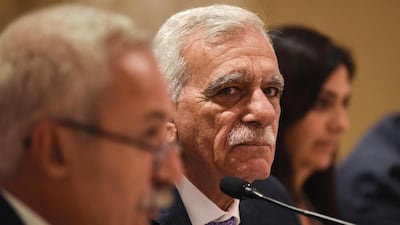Three mayors from Turkey’s south-east who were removed from office and replaced by government-appointed officials condemned their dismissals as undemocratic on Thursday.
The mayors from the left-wing, pro-Kurdish Peoples' Democratic Party (HDP) were removed from their posts in Mardin, Van and Diyarbakir last week, less than five months after winning large majorities in their provinces.
The ousting of Ahmet Turk, Bedia Ozgokce Ertan and Adnan Selcuk Mizrakli sparked demonstrations across the south-east, as well as cities such as Ankara and Istanbul. Police responded with water cannon, tear gas and rubber bullets as hundreds were arrested in the turmoil.
The trio were replaced by officials appointed by the Interior Ministry as investigations were announced into allegations of ties to the Kurdistan Workers’ Party (PKK), which has waged a four-decade insurgency against Ankara.
The charges against the three mayors – who work with a party-appointed co-mayor under the HDP’s practice of having a man and a woman share senior roles – include offering jobs to the relatives of PKK members and naming local parks and streets after jailed insurgents, the Interior Ministry said.
The government has also said that the HDP’s co-mayor system is unconstitutional.
“The decision is a political one,” said Mr Turk, a veteran politician who was sacked as Mardin’s mayor. “It’s about an attempt to block the Kurdish struggle for democracy, our struggle for a democratic Turkey.
“Today there’s a growing demand for change from the opposition and the government is creating hindrances for us and creating enemies to protect their own interests,” he told reporters at a joint press conference in Istanbul
Ms Ertan, removed from her role in Van, said voters’ rights had been usurped.
“Under this regime, which is becoming more and more authoritarian, no one’s constitutional rights are protected,” she said.
“For justice, for cultural rights, for basic rights there’s a need for a well-functioning legal basis. When separation of the three powers – the executive, legislative and judicial – is not supported enough, not defended enough, the rights of people are violated.”
The appointment of unelected officials in place of mayors was introduced during the two-year emergency rule imposed after an attempted coup in 2016. According to the HDP, the heads of 94 of the 99 local administrations it ran were replaced by government-appointed trustees during this period.
Among them was Mr Turk, who was dismissed as Mardin’s mayor in 2016 before standing again in March.
Since coming to office, many newly elected HDP mayors have revealed mismanagement and profligate spending by the officials who previously oversaw their municipalities.
This week it was claimed that Mardin Governor Mustafa Yaman, who replaced Mr Turk for a second time last week, spent more than US$100,000 (Dh367,000) of public money on jewellery as gifts for Interior Minister Suleyman Soylu and Urbanisation Minister Murat Kurum in 2018.
Shortly after taking office, Mr Mizrakli released a video showing a luxury en suite bathroom installed at the offices of Diyarbakir’s previous trustee Cumali Atilla. He also claimed Mr Atilla had spent $15,500 on coffee cup sets to be given as gifts.
Politicians from other opposition parties have lent support to the three dismissed mayors amid fears that trustees could replace opposition mayors who won Turkey’s largest cities from the ruling Justice and Development Party (AKP) in March.
President Recep Tayyip Erdogan this week hinted at the possibility of other mayors being dismissed. Speaking to journalists on a flight from Moscow on Tuesday evening, he said he had ordered the justice minister to investigate elected officials over possible terror links.
Istanbul mayor Ekrem Imamoglu, who was elected again in June after AKP objections to his victory in March, warned against "ignoring the will of the people". On Thursday he announced he would visit Mr Mizrakli in Diyarbakir this weekend.
"Who can say the removal of the mayors is not also a threat to municipalities currently ruled by other opposition parties?" wrote Cigdem Toker, a columnist for the opposition Sozcu newspaper.
Former AKP heavyweights Abdullah Gul and Ahmet Davutoglu, who have recently been linked to the formation of new parties to challenge the government, also condemned the dismissals as undemocratic.
The three mayors met a group of EU ambassadors in Ankara on Wednesday night.
The dismissals came as Turkey was working with the US to establish a safe zone along its border in Syrian territory controlled by Kurdish militants linked to the PKK.
Turkey has amassed troops along the border and threatened to intervene unilaterally to carve out a buffer between its border and fighters from the People’s Protection Units (YPG), which led the ground battle against ISIS in Syria with American support.
Turkish forces have also been carrying out renewed operations against the PKK in northern Iraq, where the group has its main headquarters.
Some observers have suggested the attack on the political voice of Kurds inside Turkey is tied to the build-up of pressure on the YPG.

